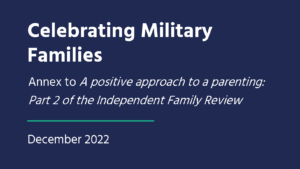Today I’ve published Celebrating Military Families, an annex to Part 2 of my independent Family Review. Military families are remarkable and I want to celebrate the huge contribution they make to our country. This special report published today looks at how to make sure they in turn receive the support and services to which they are entitled.
Foreword
Over the recent years, the Armed Forces of the United Kingdom have been tremendously active in keeping us safe and supporting our daily lives. From their Covid efforts, building the Nightingale Hospital in just nine days, to the 5,949 members of the Armed Forces deployed on ceremonial duties following the Queen’s death. They have been a pillar of support during some of the darkest moments in recent years and remain a bastion of strength to countries in need of protection across the world.
This year we have also seen the atrocities in Ukraine. The conflict reminds us all of the immense but essential sacrifice service personnel make. Every day the military provides security and protection from those that would destroy this country. Behind the efforts we see of the Armed Forces are their children, parents, and families. What is often missed is the huge sacrifice they make to support members of the armed forces. As I have heard throughout my independent Family Review, everyone draws on their family for strength, and members of the military are no different. I wanted to consider military families within the context of my Family Review so I could ask whether we – both public services and wider society – are doing enough to support military families themselves.
As Children’s Commissioner I believe there is a great deal of goodwill towards military families, both amongst children and professionals, but much less awareness of how we can support them. Compared to other groups of children with specific and unique needs, I feel there is less understanding of what is required from public services. This is partly because of the resilience of these children and their families. As the research for this report shows, military children consistently outperform their peers, when we look at the findings controlling for the fact that military children are often moved around to follow their parents’ roles. Overall, they are often still at a disadvantaged by the demands of being in a military family, and that is why we have to do more.
The Armed Forces Covenant is central to this, which is why it is so important it is now enshrined in legislation. The Covenant makes clear that neither armed forces nor their families should be disadvantaged as a result of serving in the military. But vital to the Covenant being properly upheld is public services and wider society understanding the needs of military families. This is where I hope this report can add value. The nature of military life in the UK is changing: there are many more women serving than ever before and increasingly children are growing up with two serving parents. The nature of serving is also changing: across each of the forces are an array of different roles, all with different demands. Finally, the nature of life in the military is changing to reflect modern society, with perhaps the biggest change being the move away from living on barracks and into the community.
Nowhere are these changes more apparent than in education, which is why the new analysis my office has conducted is so important. The story in education is one of longstanding challenges – children moving schools when their parents are re-deployed – in a new context – fewer children living in barracks. Traditionally, we would have thought of education for military children being delivered in specialist schools, but my research reveals that:
- The majority of military children are being educated in schools where there are less than 30 children from serving families.
- The majority of schools have no military children in them, but a significant minority – about 1 in 4 schools – are serving small military populations and about 1 in 20 schools have a significant number of military children.
While this research has focused on schools, the same principles apply across the public service, where we need to be making small adjustments to support a dispersed military community. Whether it is GP services, or NHS waiting lists, moving between areas creates issues accessing public services, and we need to address these sensibly. Crucially, we have to make the offer to military families clear and accessible. Military families do not want to, and should not have to, beg for sensible adjustments they are entitled to in law and which the British public want them to have.
However, this is not just about public services. The message I have heard throughout this Review is that social connections, and familial networks (which often include close friends) are vital for all families. Maintaining these is particularly hard for families moving around frequently. There is no easy fix for this. There are some policy changes that I believe would help, but I think it is also beholden on all of us, who benefit from the military’s service, to consider what they and their families may need from us and be willing to make these adjustments in our local communities.
Read the full report here.






